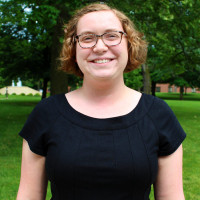In Her Own Words: Olivia Presnell
In our current “In Her Own Words” series, Forester women who are making a difference in the world as advanced healthcare professionals are sharing their stories. Less than 10 years after they earned their bachelor’s degrees from Huntington University, these women have already traveled unique paths to careers in healthcare practice. They have become dentists, physical therapists, physician assistants, medical doctors, and more — and this is only the beginning.
The story that follows comes from an interview with one such Forester.
Olivia Presnell (2017)
Physician Assistant
After graduating from HU, Olivia moved to Michigan to attend physician assistant (PA) school and has remained in Michigan ever since. She worked in an emergency room for a while before becoming a part of a private family practice. As a PA, she is well equipped for generalist practice and makes a point to ensure that her patients feel seen and heard when they come to her office.
At what point did you realize you wanted to go into medicine?
I think I was a senior in high school, maybe a junior, and I remember sitting in church and seeing this medical missions video up on the screen. And I remember watching it and just thinking, “Huh. I think I would like to do that. I think I would like to work in that type of work, doing that type of stuff.” I’m really, really passionate about the idea that medicine opens a lot of doors for healing and wellness in terms of our physical health, our mental health, our emotional health, and our spiritual health. I think working in healthcare gives you a really vulnerable sort of access to people in different spaces of need. And I have always thought that was really, really cool. And I felt like the Lord wanted to use me in that specific realm to reach people.
Why did you choose your area of practice?
After I saw that video, I thought, “Okay. I’ve got to go to med school. That’s what I’ve got to do.” So I went through three of my four years at Huntington thinking I’m going to med school. I was preparing that way. But in my junior year, the year I took the MCAT [the Medical College Admission Test], I just remember feeling a lot of unrest about the next four to eight years of my life. When I thought about what those were going to look like and what I wanted to do, I just didn’t feel settled in that.
I started looking around at other options that would allow me to work in medicine that didn’t involve some of the things that med school and that pathway involved. I found out more about what a PA is — I didn’t really know all that much at the time — [and] started asking around to talk with some friends or people I knew who knew both PAs and MDs, to pick their brains about their experience and what they liked about it, what they didn’t. Through that whole year of thinking and praying, the more I learned about the route of the PA and what that looked like and what their practice looked like, the more settled I felt about changing my path a little bit and pursuing that instead of med school.
It took me the whole year to figure that out, so I took the MCAT, but in the end ultimately decided to pursue PA school instead of med school. And honestly, I haven’t regretted it one time. It’s been a different path, a different timeline, and it’s opened up some opportunity to do other things in this immediate post-college period that I think I wouldn’t have been able to do otherwise.
What is the most important lesson you’ve learned along the way?
I think the most important lesson that I’ve learned is, perhaps, that when I work, I ought to work for the Lord and not for myself or a paycheck or those kinds of things. I say that because PA school, even going through clinical experiences, was really high intensity and you felt like you were pretty constantly under a sense of judgment, like you were being critiqued all the time. That could often feel like you were doing what you were doing to please other people or to try to get affirmation from other people. It really challenged me to question “What am I doing, why am I doing it, and who does my affirmation come from?”
Even after that, getting into practice and working with so many different types of people, I think that that’s consistently a lesson I’ve been reminded of — I am working for the Lord and trying to care for other people. Even now, there’s certainly hard things about medicine and things that are pretty draining, and that’s the thing that every day just keeps me going. That’s the thing that continues to ground me.
What are you proudest of when it comes to your career?
I am the most proud of the way that I interact with my patients. I really value the simple acts of kindness and giving people that extra 12 inches of “How can I show you kindness today? How can I be personable today?” I have learned in the last three years of practice that it does come at a cost, but I feel convicted that that’s something that really matters and something that Christ is asking me to sacrifice, that extra bit of energy or time to make someone feel seen and valued.


